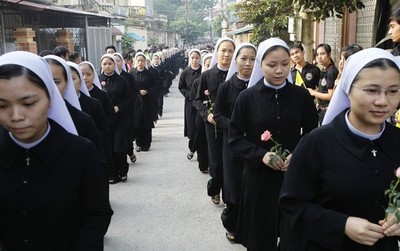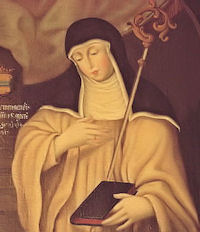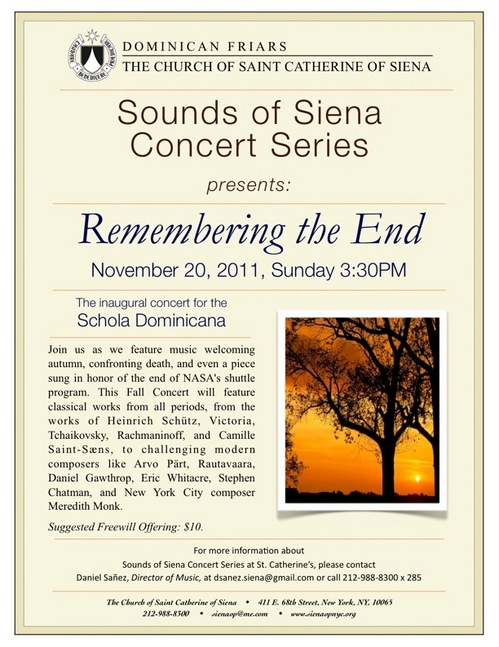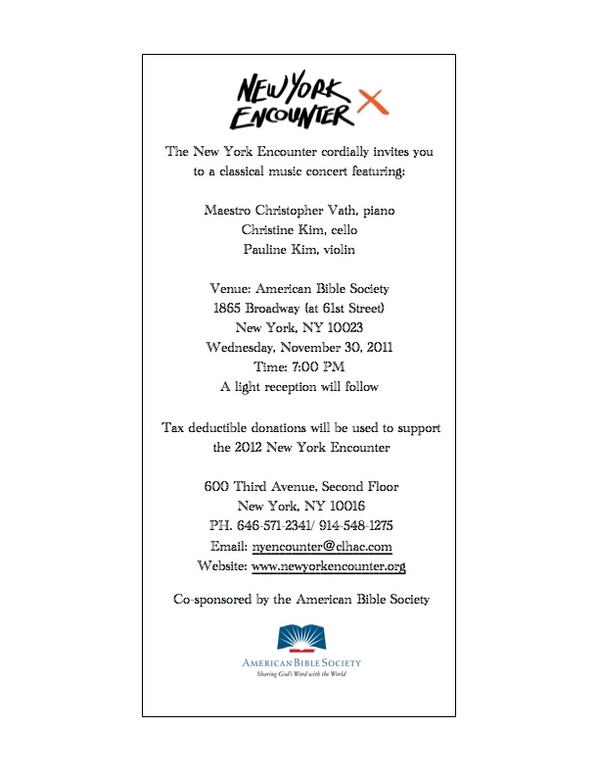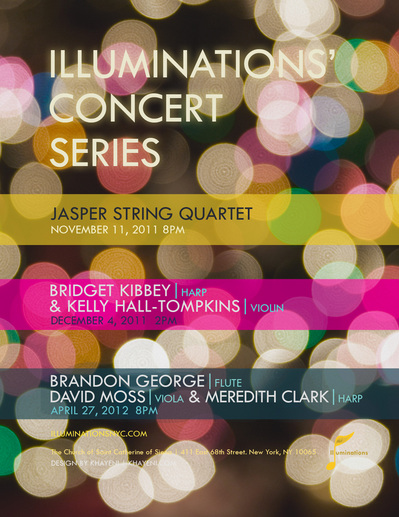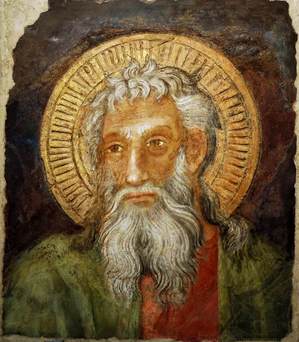
November 2011 Archives

Lectio Divina is of course central to Benedictine spirituality,
with several hours a day of prayerful reading of Scripture and other spiritual
texts required of monks in the Rule.
And it is also one of the central themes of Pope
Benedict XVI's Apostolic Exhortation Verbum Domini. Scattered through the
document are the reasons why lectio is so crucial. Here is my summation
of the reasons he sets out for why we should do lectio divina.
1. To please God by listening to him. Pope quotes
Origen: "Do your reading with the intent of believing in and pleasing God."
2. To build the Church as a
community. "While it is a word addressed to each of us
personally, it is also a word which builds community, which builds the
Church...The reading of the word of God... enables us to deepen our sense of
belonging to the Church, and helps us to grow in familiarity with God."
3. To nourish and sustain us 'on our journey of
penance and conversion': through it, we grow in love and truth.
4. In order to discern God's will for us,
and convert us: "Contemplation aims at creating within us a truly
wise and discerning vision of reality, as God sees it, and at forming within us
"the mind of Christ" (1 Cor 2:16).
The Pope particularly recommends lectio divina to
seminarians because: "It is in the light and strength of God's word that one's
specific vocation can be discerned and appreciated, loved and followed, and
one's proper mission carried out..." Lay people to should be trained, he
urges, "to discern God's will through a familiarity with his word, read and
studied in the Church under the guidance of her legitimate pastors."
He goes on: "Saint Paul tells us: "Do not be conformed
to this world, but be transformed by the renewal of your mind, that you may
prove what is the will of God, what is good and acceptable and perfect " (12:2).
The word of God appears here as a criterion for discernment: it is "living and
active, sharper than any two-edged sword, piercing to the division of soul and
spirit, of joints and marrow, and discerning the thoughts and intentions of the
heart" (Heb 4:12).", and "....by nourishing the heart with thoughts of God, so
that faith, as our response to the word, may become a new criterion for judging
and evaluation persons and things, events and issues"...."
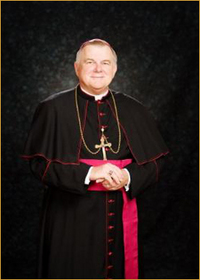
In today's editorial piece, Miami Archbishop Thomas Wenski personally addressed the US President Barack Obama on matters pertaining to conscience and religious freedom. Conscience is more than a policy; conscience is a basic human right given by God Himself. It is good piece for all to read --especially Catholics-- as it outlines recent history lest we forget. Wenski is right to bring to light the transgressions on conscience by this Administration. Our thanks to the Archbishop for teaching the faith. Thoughts?
In May 2009, President Obama gave the commencement address at Notre Dame University and received an honorary degree. That Notre Dame would confer an honorary degree on an elected official who advances abortion rights in contradiction to Catholic teaching caused no small controversy among many Catholics throughout the United States.
Those who supported Notre Dame felt vindicated, however, when in his speech the President promised to "honor the conscience of those who disagree with abortion," stating that his Administration would provide "sensible" protections for those who wanted no involvement in the procedure. This would presumably include health-care providers, social-service providers, and consumers who might otherwise have to pay through their health-care plans for other people's abortions. Obama later reiterated this position to Catholic newspaper editors, stating that he would make such protections "robust."
Two central interests in the ministry of Pope Benedict are music and the sacred Liturgy; other interests you might say are evangelization, theology and culture. At recent gatherings with the Pope he spoke about music as a concert given by a group of Spanish musicians and then to the bishops of New York State making their pilgrimage to Rome to pray and speak with the Pope about their work. Below are two interesting sets of ideas worthy of reflection:
On music
"...the magic worked by music, the universal language which can overcome all barriers and allow us to enter the world of others, of a nation or a culture, at the same time enabling us to turn our mind and hearts ... to the world of God."
Pope Benedict XVI to musiciansNovember 26, 2011
On the sacred Liturgy
"A weakened sense of the meaning and importance of Christian
worship can only lead to a weakened sense of the specific and essential
vocation of the laity to imbue the temporal order with the spirit of the
Gospel. America has a proud tradition of respect for the Sabbath; this legacy
needs to be consolidated as a summons to the service of God's Kingdom and the
renewal of the social fabric in accordance with its unchanging truth."
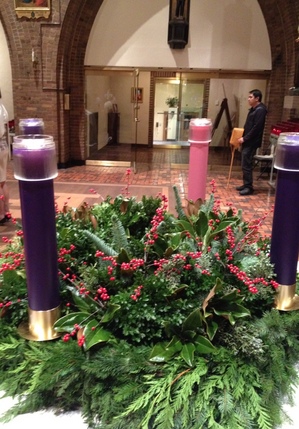
Therefore we are called to be vigilant because we do not know the 'precise moment' when the master will return to the house. The 'house' can be seen as an image of the Christian community which prepares itself with vigilance through prayer and works, to welcome the master. The 'house' can also be thought of as the spiritual dwelling of each of us that needs to be built daily.
Everyone must also take care to complete the work that God has entrusted to them, watching that they will not find themselves unprepared for the Lord when he comes. The season of Advent calls us to strengthen our spirit of prayer, carefully fighting the negligence and the weakness that makes us yield to sin.
Blessed John Henry Newman wrote in his spiritual diary that to be vigilant with Christ is to look ahead without forgetting the past. It is not to forget that He has suffered for us, it is to lose ourselves in contemplation of the grandeur of redemption. It is to continually renew the passion and agony of Christ - to cover with joy that mantle of affliction that Christ wore first and then left behind when he ascended into heaven. It is separation from this sensible world to join the life beyond the senses. This is how Christ will come, and come in the way he has said. (J. H. Newman, Diario spirituale e meditazione, 93).
Excerpts of a Letter for the First Sunday of Advent from the Congregation of Clergy
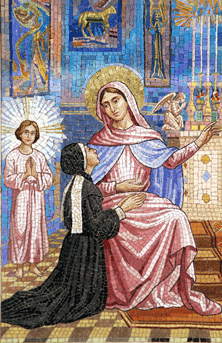
Today we celebrate the Feast Day of Our Lady of the Miraculous Medal. On this day, November 27th, in 1830, the Immaculate Virgin Mary appeared to Saint Catherine Laboure in the chapel of the motherhouse of the Daughters of Charity in Paris.
At one point during the apparition Catherine saw Our Lady standing on a globe, with dazzling rays of light streaming from her outstretched hands. Framing the figure was an inscription: O Mary, conceived without sin, pray for us who have recourse to thee.
Mary spoke to Catherine: "Have a medal struck upon this model. Those who wear it will receive great graces." The Medal of the Blessed Virgin Mary, popularly known as the Miraculous Medal, was approved by Pope Leo XIII on July 23, 1894.
For more info, visit...
As you know, the Pope is meeting for next several months with all the bishops of the United States. Two weeks ago I noted the Ad Limina Apostolorum of the New England bishops; this week the Pope meets with the New York bishops and next week he'll be meeting with the New Jersey and Pennsylvania bishops. His reflections and leadership on key areas are crucial for all of us to pay attention to right now for the good of the Church. The text of his address to the bishops of these three regions is given below.
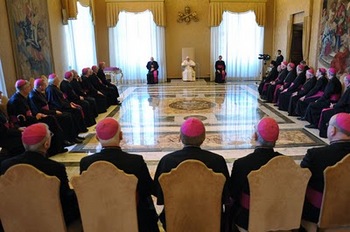
I greet you all with affection in the Lord and, through you, the Bishops from the United States who in the course of the coming year will make their visits ad limina Apostolorum.
Our meetings are the first since my 2008 Pastoral Visit to your country, which was intended to encourage the Catholics of America in the wake of the scandal and disorientation caused by the sexual abuse crisis of recent decades. I wished to acknowledge personally the suffering inflicted on the victims and the honest efforts made both to ensure the safety of our children and to deal appropriately and transparently with allegations as they arise. It is my hope that the Church's conscientious efforts to confront this reality will help the broader community to recognize the causes, true extent and devastating consequences of sexual abuse, and to respond effectively to this scourge which affects every level of society. By the same token, just as the Church is rightly held to exacting standards in this regard, all other institutions, without exception, should be held to the same standards.
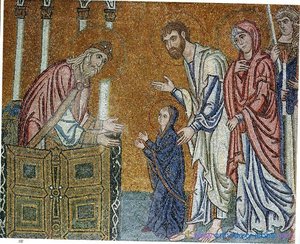 As we Venerate the glorious memory of the most holy Virgin Mary, grant, we pray, O Lord, through her intercession, that we, too, may merit to receive from the fullness of your grace.
As we Venerate the glorious memory of the most holy Virgin Mary, grant, we pray, O Lord, through her intercession, that we, too, may merit to receive from the fullness of your grace.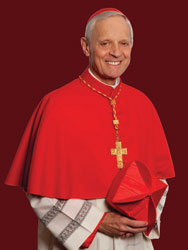
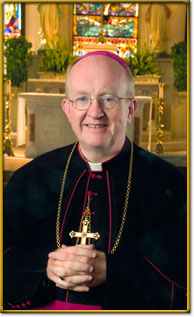 At the general assembly of the US Bishops today, Cardinal Donald Wuerl, Archbishop of Washington, DC, announced the Vatican appointment of Bishop Kevin W. Vann, Bishop of Fort Worth Texas, to be the Ecclesiastical Delegate for the Pastoral Provision (in effect since 1981). Vann succeeds Archbishop John J. Myers of Newark. Vann will oversee the the formation and admittance of former Anglican clergy to the Roman Church. He will work closely with Cardinal Wuerl who has oversight of the temporary church structure of the Anglican Ordinariate in the USA.
At the general assembly of the US Bishops today, Cardinal Donald Wuerl, Archbishop of Washington, DC, announced the Vatican appointment of Bishop Kevin W. Vann, Bishop of Fort Worth Texas, to be the Ecclesiastical Delegate for the Pastoral Provision (in effect since 1981). Vann succeeds Archbishop John J. Myers of Newark. Vann will oversee the the formation and admittance of former Anglican clergy to the Roman Church. He will work closely with Cardinal Wuerl who has oversight of the temporary church structure of the Anglican Ordinariate in the USA.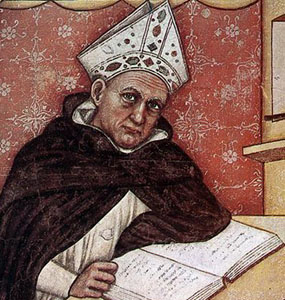 St Albert the Great reminds us that there is
friendship between science and faith and that through their vocation to the
study of nature, scientists can take an authentic and fascinating path of
holiness.
St Albert the Great reminds us that there is
friendship between science and faith and that through their vocation to the
study of nature, scientists can take an authentic and fascinating path of
holiness.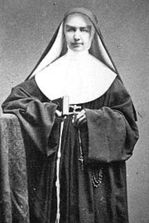
At their annual meeting, the US bishops voted to have add to the US liturgical calendar Blessed John Paul II and Blessed Marianne Cope, both are optional liturgical memorials in the proper of saints. October 22 is designated to honor Blessed John Paul and January 23 for Mother Marianne.
The USCCB Ad Hoc Committee on Religious Liberty headed up by Bishop William Edward Lori announces the bishops and consultants:
Ten bishops and 10 consultants were named to the committee in early November.
New members are Bishop John O. Barres of Allentown, Pa.; Archbishop Charles J. Chaput of Philadelphia; Bishop Daniel E. Flores of Brownsville, Texas; Archbishop Wilton D. Gregory of Atlanta; Archbishop John C. Nienstedt of St. Paul and Minneapolis; Bishop Thomas J. Olmsted of Phoenix; Bishop Thomas J. Paprocki of Springfield, Ill.; Archbishop Thomas J. Rodi of Mobile, Ala.; Archbishop J. Peter Sartain of Seattle; and Cardinal Donald W. Wuerl of Washington.
Consultants include Carl Anderson, supreme knight of the Knights of
Columbus; attorneys Kevin Baine, Philip Lacovara and L. Martin Nussbaum; Father
Raymond J. de Souza, a columnist and priest of the Archdiocese of Kingston, Ontario;
Richard Garnett, associate dean and professor of law and political science at
the University of Notre Dame; John Garvey, president of The Catholic University
of America; Mary Ann Glendon, Harvard Law School professor; Judge Michael
McConnell, Stanford University Law School professor; and Mary Ellen Russell,
executive director of the Maryland Catholic Conference.
Lori said we need to have "a new appreciation for religious liberty and a renewed determination to defend it."
As mere commentary, the lay members of this committee are impressive.
You can read Archbishop Dolan's presidential address in its entirety elsewhere; here I offer a few points from the address to reflect upon:
...our most pressing pastoral challenge today is to reclaim that truth, to restore the luster, the credibility, the beauty of the Church "ever ancient, ever new," renewing her as the face of Jesus, just as He is the face of God. Maybe our most urgent pastoral priority is to lead our people to see, meet, hear and embrace anew Jesus in and through His Church.
Because, as the chilling statistics we
cannot ignore tell us, fewer and fewer of our beloved people -- to say nothing
about those outside the household of the faith -- are convinced that Jesus and
His Church are one. As Father Ronald Rolheiser wonders, we may be living in a
post-ecclesial era, as people seem to prefer
a shepherd with no flock,
to believe without belonging,
a spiritual family with God as my father, as long as I'm
the only child,
"spirituality" without religion
faith without the faithful
Christ without His Church.
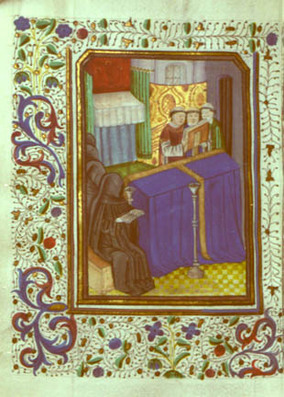 In Benedictine communities around the world today's
Liturgical Observance is offered for the souls of all Benedictine monks, nuns,
sisters and Oblates in purgatory.
In Benedictine communities around the world today's
Liturgical Observance is offered for the souls of all Benedictine monks, nuns,
sisters and Oblates in purgatory. 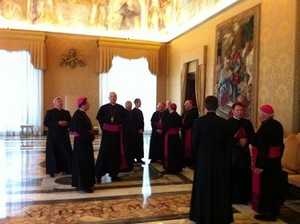 There's not been lots of details revealed about the recent Ad Limina of New England's 18 bishops. That may be because most of the meetings are private affairs between a bishop --or a group of bishops-- and the Pope and his 12 key Vatican collaborators. The pilgrimage in Rome happened 3-9 November. The two New England Metropolitans, Cardinal O'Malley and Archbishop Mansell, led the bishops with the coordinating help of Bishop Evans.
There's not been lots of details revealed about the recent Ad Limina of New England's 18 bishops. That may be because most of the meetings are private affairs between a bishop --or a group of bishops-- and the Pope and his 12 key Vatican collaborators. The pilgrimage in Rome happened 3-9 November. The two New England Metropolitans, Cardinal O'Malley and Archbishop Mansell, led the bishops with the coordinating help of Bishop Evans.Today, Pope Benedict spoke to the volunteers who work with the Cor Unum group led by Cardinal Robert Sarah. He defines very clearly charitable work. Pay attention Communion and Liberation people!!!
I am grateful for the opportunity to greet you as you meet under the auspices of the Pontifical Council "Cor Unum" in this European Year of Volunteering.
Let me begin by thanking Cardinal Robert Sarah for the kind words he has addressed to me on your behalf. I would also like to express my deep gratitude to you and, by extension, to the millions of Catholic volunteers who contribute, regularly and generously, to the Church's charitable mission throughout the world. At the present time, marked as it is by crisis and uncertainty, your commitment is a reason for confidence, since it shows that goodness exists and that it is growing in our midst. The faith of all Catholics is surely strengthened when they see the good that is being done in the name of Christ (cf. Philem 6).
For Christians, volunteer work is not merely an expression of good will. It is based on a personal experience of Christ. He was the first to serve humanity, he freely gave his life for the good of all. That gift was not based on our merits. From this we learn that God gives us himself. More than that: Deus Caritas est - God is love, to quote a phrase from the First Letter of Saint John (4:8) which I employed as the title of my first Encyclical Letter. The experience of God's generous love challenges us and liberates us to adopt the same attitude towards our brothers and sisters: "You received with paying, give without pay" (Mt 10:8). We experience this especially in the Eucharist when the Son of God, in the breaking of bread, brings together the vertical dimension of his divine gift with the horizontal dimension of our service to our brothers and sisters.
The first reading at Mass today was taken from the Book of Wisdom. Not a regularly heard from book of the Bible. The Church offers us at least two things today with regard to Wisdom: what is it (how do we define what it is) and who is Wisdom?
Both Saint John the Evangelist and Saint Paul indicate that Wisdom is Jesus Christ. You might say that the contents of the Book of Wisdom is perfected in the person of Jesus Christ. With that in mind, here's what we heard today.
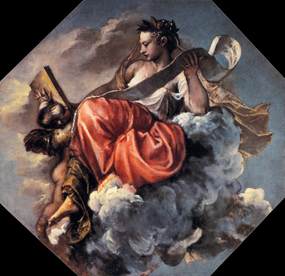
In Wisdom is a spirit
intelligent, holy, unique,
Manifold, subtle, agile,
clear, unstained, certain,
Not baneful, loving the good, keen,
unhampered, beneficent, kindly,
Firm, secure, tranquil,
all-powerful, all-seeing,
And pervading all spirits,
though they be intelligent, pure and very subtle.
For Wisdom is mobile beyond all motion,
and she penetrates and pervades all things by reason of her purity.
For she is an aura of the might of God
and a pure effusion of the glory of the Almighty;
therefore nought that is sullied enters into her.
For she is the refulgence of eternal light,
the spotless mirror of the power of God,
the image of his goodness.
And she, who is one, can do all things,
and renews everything while herself perduring;
And passing into holy souls from age to age,
she produces friends of God and prophets.
For there is nought God loves, be it not one who dwells with Wisdom.
For she is fairer than the sun
and surpasses every constellation of the stars.
Compared to light, she takes precedence;
for that, indeed, night supplants,
but wickedness prevails not over Wisdom.
Indeed, she reaches from end to end mightily
and governs all things well.
Wisdom 7:22b-8:1
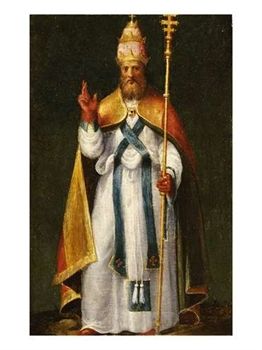
Pope Saint Leo the
Great stated: "The faith of those who live their faith is a serene faith. What
you long for will be given you; what you love will be yours for ever. Since it
is by giving alms that everything is pure for you, you will also receive that
blessing which is promised next by the Lord: the Godhead that no man has been
able to see. In the inexpressible joy of this eternal vision, human nature will
possess what eye has not seen or ear heard, what man's heart has never
conceived."
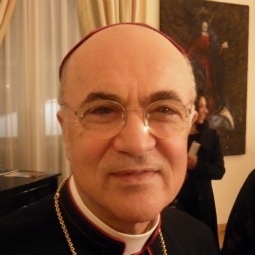 His Excellency, Archbishop Carlo Maria Viganò, 70, was appointed by Pope Benedict XVI to be his personal representative to the Church in the United States and to the US government, on 19 October 2011. As ambassador he'll have to recommend to the Pope the new bishops, handle ecclesial matters of significance and work with the US politicians. Archbishop Viganò met with the Pope this morning. He is set arrive in time for the general meeting of US Bishops, 14-16 November in Baltimore.
His Excellency, Archbishop Carlo Maria Viganò, 70, was appointed by Pope Benedict XVI to be his personal representative to the Church in the United States and to the US government, on 19 October 2011. As ambassador he'll have to recommend to the Pope the new bishops, handle ecclesial matters of significance and work with the US politicians. Archbishop Viganò met with the Pope this morning. He is set arrive in time for the general meeting of US Bishops, 14-16 November in Baltimore.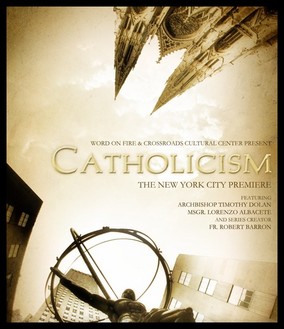
You are invited to a screening of CATHOLICISM with ArchbishopTimothy Dolan's introduction and a presentation by project's creator
Father Robert Barron, and Monsignor Lorenzo Albacete.
A reception and book signing following the event.
Presented by Crossroads Cultural Center and Word on Fire
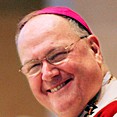 Archbishop Timothy M. Dolan
Archbishop Timothy M. DolanArchbishop of New York
President, United States Conference of Catholic Bishops
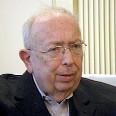 Monsignor Lorenzo Albacete
Monsignor Lorenzo AlbaceteAuthor, theologian, columnist
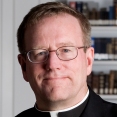 Father Robert Barron
Father Robert BarronAuthor, speaker, theologian Founder of Word On Fire.
This event is open to the public and free of charge, but seating is limited.
Tickets must be obtained online through www.catholicism.eventbrite.com
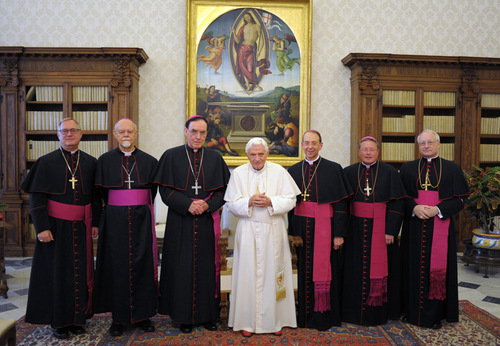 Pope Benedict XVI met Nov. 5 with U.S. bishops from northeastern states on their "ad limina" visits to the Vatican to report on the status of their dioceses. From left are Bishop Thomas J. Tobin of Providence, R.I.; retired Auxiliary Bishop Peter A. Rosazza of Hartford.; Archbishop Henry J. Mansell of Hartford; Pope Benedict XVI; Bishop William E. Lori of Bridgeport; Bishop Michael R. Cote of Norwhich; Auxiliary Bishop Robert C. Evans of Providence, R.I. (CNS photo/L'Osservatore Romano)
Pope Benedict XVI met Nov. 5 with U.S. bishops from northeastern states on their "ad limina" visits to the Vatican to report on the status of their dioceses. From left are Bishop Thomas J. Tobin of Providence, R.I.; retired Auxiliary Bishop Peter A. Rosazza of Hartford.; Archbishop Henry J. Mansell of Hartford; Pope Benedict XVI; Bishop William E. Lori of Bridgeport; Bishop Michael R. Cote of Norwhich; Auxiliary Bishop Robert C. Evans of Providence, R.I. (CNS photo/L'Osservatore Romano)
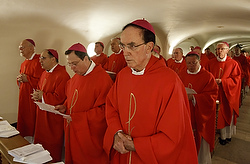 The bishops of the United States have begun their official visit to heart of the Church by praying at the tombs of the Apostles Peter and Paul, meeting with Pope Benedict, and meeting with the various heads of the Church's departments at the Holy See to report on the various apostolic works undertaken for the proclamation of the Gospel.
The bishops of the United States have begun their official visit to heart of the Church by praying at the tombs of the Apostles Peter and Paul, meeting with Pope Benedict, and meeting with the various heads of the Church's departments at the Holy See to report on the various apostolic works undertaken for the proclamation of the Gospel.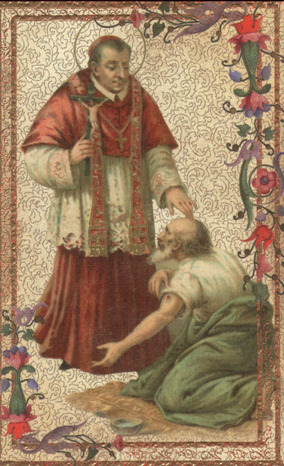 Preserve in the midst of your people, we ask, O
Lord, the spirit with which you filled the Bishop Saint Charles Borromeo, that
your Church may be constantly renewed and, by conforming herself to the
likeness of Christ, may show his face to the world.
Preserve in the midst of your people, we ask, O
Lord, the spirit with which you filled the Bishop Saint Charles Borromeo, that
your Church may be constantly renewed and, by conforming herself to the
likeness of Christ, may show his face to the world.
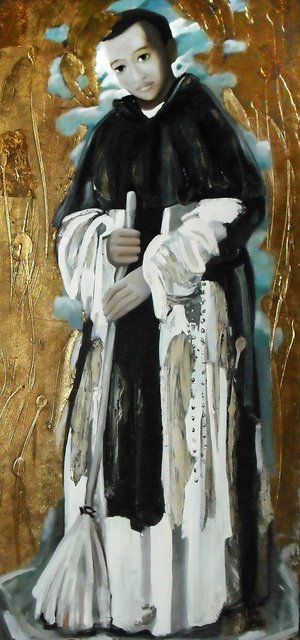
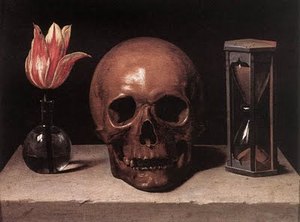
In Rome, Pope Benedict XVI spoke of this gesture of remembrance:
Today, the day after the Solemnity of All Saints, the Church invites us to pray for the faithful departed. This yearly commemoration, often marked by visits to the cemetery, is an occasion to ponder the mystery of death and to renew our faith in the promise of eternal life held out to us by Christ's resurrection. As human beings, we have a natural fear of death and we rebel against its apparent finality. Faith teaches us that the fear of death is lightened by a great hope, the hope of eternity, which gives our lives their fullest meaning. The God who is love offers us the promise of eternal life through the death and resurrection of his Son. In Christ, death no longer appears as an abyss of emptiness, but rather a path to life which will never end. Christ is the resurrection and the life; whoever believes in him will never die. Each Sunday, in reciting the Creed, we reaffirm our faith in this mystery. As we remember our dear departed ones, united with them in the communion of the saints, may our faith inspire us to follow Christ more closely and to work in this world to build a future of hope.
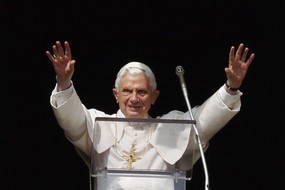 The general intention
The general intention